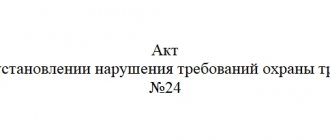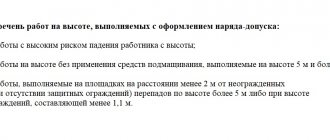Labor protection systems in the Russian Federation
The organizer or craftsman is responsible for violation of labor protection requirements when organizing the workplace. The main document regulating labor relations in Russia is the Labor Code, the Labor Code of the Russian Federation. The document is the basis for the development of individual legal acts, the construction of a federal and sectoral system of labor legislation.
Ignorance of the laws does not exempt an employee from material, disciplinary, or criminal liability for violation of labor protection requirements and rules. Neglect of safety and health naturally ends in injury or mutilation of the worker. Therefore, employees study the mandatory instructions and follow them.
For violation of labor safety standards, collective and individual liability is applied. The production organizer is certified for knowledge of the requirements, regulations, standards and scientific organization of a specific labor process:
The package of documents includes:
- legal codes of practice;
- organizational and technical industry materials;
- sanitary, hygienic and preventive requirements;
- standards and regulations for environmental protection.
Legal liability for violation of labor protection requirements of an official occurs in case of failure to comply with the provisions from materials based on GOST 12.0.004-2015. Here are general safety provisions and the procedure for their application.
A special assessment of working conditions (SOUT) is used as a universal tool for assessing harm to health in a specific service area. The methodology for applying the SOUT system is set out in the appendix to Law 33N of the Ministry of Labor of the Russian Federation. The organizer has access to standard instructions on the investigation and recording of accidents, the standard for issuing protective clothing and special food. Responsibility and punishment for violation of labor protection legislation rests with the manager. For violation of labor protection, an official is subject to legal prosecution.
Penalties for safety lapses
Experts say that labor protection and fire safety requirements were created in blood. This is so, each item is added on the basis of characteristic deficiencies identified as a result of the investigation of an accident with serious consequences.
According to Art. 419 of the Labor Code of the Russian Federation, fines are imposed on any worker, regardless of status, for identified violations in the field of labor protection. For the purpose of prevention, control and prevention of work injuries, standards for safe work processes have been developed.
In the work collective, everyone performs the duties prescribed by job descriptions. The greater the damage to the enterprise and people's health caused as a result of unscrupulous performance of duties, the harsher the punishment for the person responsible for violating labor protection.
Business Tips for Safety Engineers
It is a mistake to think that working as a labor protection engineer is easy and you don’t need to do anything. This work requires special attention and mobility.
Recommendations for occupational safety and health workers:
- Ensure control over the preparation of orders on labor protection and industrial safety.
- It is imperative to ensure that all technological equipment is assigned to responsible persons. If there is none, then responsibility automatically switches to the manager, that is, during inspections, emergencies or incidents, the boss will be personally responsible for the mistake, and he is unlikely to like this.
- To control the conduct of briefings, you can prepare a list of employees in advance. Indicate whether the training was completed or not due to the employee being on sick leave, on vacation, or without a valid reason. This way, it will be possible to accurately track which employees have completed periodic training and who have not.
- To track the technical examination and examination of industrial safety of technical devices, you can prepare in advance a schedule for conducting these inspections, which can be updated every year.
- The operating efficiency of ventilation units is checked annually, so it is better to keep this area under control. The air quality in the work area depends on this. Based on the results of the checks, there should be a record in the device passport.
- Control over the periodic certification of workers and engineers is ensured by the development of a schedule that must be monitored monthly.
- To avoid any questions about what area it is necessary to certify employees, it is necessary to consider what types of activities they are engaged in at work, and if necessary, you can involve their managers.
- Medical examinations cannot be ignored. It is imperative to participate or independently prepare lists of workers subject to medical examination. It is better to attend this event in person. Why is this necessary?
Sanctions for violators of labor protection
The production organizer and specialists are obliged to provide not only safe working conditions, but also take care of the everyday life and prevention of diseases of workers. During an investigation or routine inspection of an enterprise, liability for violation of labor protection rules is considered in connection with job responsibilities.
Based on Federal Law No. 195, an organization is punished for neglecting labor safety, including suspension of activities. There are types of liability for violation of rules ensuring labor protection:
- disciplinary, in the form of a reprimand or demotion;
- material, cash account;
- administrative, in accordance with the code;
- criminal based on a court decision;
- civil law.
The choice of types of liability for violation of labor protection provisions and requirements depends on the guilt of the official.
Employers' liability
As a result of a routine inspection of the company’s activities or during an investigation of an accident, it becomes clear that due attention is not paid to compliance with safety regulations. Then the employer becomes liable for violation of labor protection requirements. Punishment is imposed in the form of financial assessments, cancellation of licenses, and suspension of activities.
For omissions, fines established by the Code of Administrative Offenses and the Code of Administrative Offenses of the Russian Federation are applied to the organization or individuals. If workplaces are not assessed according to the SOUT system, a fine of up to 80 thousand rubles may be imposed on the enterprise, and up to 10 thousand on the administrative person. The administration will have to be held accountable for violation of labor protection requirements, resulting in the absence of a security specialist. In various cases of violation, the organization is fined up to 130 thousand rubles, the responsible person up to 10 thousand rubles.
Employer's liability for violation of labor safety requirements. Let's look at the administrative code!
Administrative Code (Administrative Code) is a document that provides for the liability of a legal entity.
This means that the company will pay a fine for violating labor protection legislation (most often).
For legal entities, such a type of liability as a temporary ban on carrying out activities . In this material we will list only the main offenses contained in the Code of Administrative Offenses:
- Art. 5.27 for violation of labor legislation, as well as other acts containing labor law norms. According to part 5. Art. 5.27 of the Administrative Code entails liability in the amount of a fine of 5,000 rubles for citizens; disqualification for 1-3 years for officials, a fine of 30,000 rubles. for those who carry out activities without forming a legal entity; There is also a fine for legal entities from 100,000 rubles to 200,000 rubles.
- Art. 5.27.1 for violation of state regulatory requirements for labor protection. The maximum sanction for legal entities under this article provides for a fine of 100,000 rubles. up to 200,000 rub. or administrative suspension of work for up to 90 days.
- Art. 5.28 , which provides for liability for the employer’s evasion of participation in negotiations on the conclusion of a collective agreement (CA).
- Art. 5.31 for violation or failure to fulfill obligations under a collective agreement or agreement
- Art. 15.34 for concealing an insured event provides for the imposition of administrative liability in the form of a fine from 5,000 rubles to 10,000 rubles (applies to legal entities).
- Art. 19.5 of the Code of Administrative Offenses of the Russian Federation for failure to comply with a legal order of the relevant officials within the prescribed period.
The employer's liability in such cases is not limited only to a fine, but also threatens with additional inspections, lost profits during administrative suspension of activities and other sanctions.
But criminal liability is rightfully considered the most severe . It cannot occur for legal entities, since a legal entity is not a subject of criminal law.
But the norms of the Criminal Code of the Russian Federation are applied to officials whose activities resulted in violation of labor protection rules and serious damage.
Types of punishment for production organizers
Failure to fulfill official duties by the organizer of the proceedings is punishable by the Criminal Code of the Russian Federation and can lead to imprisonment. Administrative liability provided for violation of labor protection rules does not apply to technical personnel. The T/B engineering service monitors, investigates and reports on the condition, issues instructions, but does not bear legal responsibility. The list of labor safety violations at the enterprise is extensive and includes the following safety issues.
There is no training, instruction, or knowledge testing
According to the Labor Code of the Russian Federation, all workers must be trained in safe work practices. At the end of their education, students take exams. The person responsible for safety and security is required to periodically conduct briefings - a reminder signed in the log. Administrative liability of the manager for violation of labor protection requirements and standards will occur if the inspection reveals non-compliance with the rules for maintaining documentation:
- the log of quarterly and unscheduled briefings is missing or not completed;
- there are no developed and approved safety instructions at each workplace;
- there is no or expired safety training program;
- there is no commission for testing knowledge appointed by order of the head.
Certification of workplaces according to SOUT is not carried out
Previously, the professional suitability of a workplace was assessed using sanitary passports. Since 2014, the SOUT system has been introduced, failure to pass which is punishable. Workplaces must be standardized for harmful and dangerous factors. An independent expert organization is involved in the research, and a commission is created with the participation of production representatives.
The rules require a special assessment to be completed at each workplace. The final document serves as the basis for determining the danger of the workplace and the amount of compensation for harm caused to health, and is valid for a five-year period.
Based on the conclusion, measures are being developed to reduce the impact of harmful and dangerous factors on human health. For failure to complete an event or violation of labor protection, disciplinary liability is imposed on the head of the enterprise.
Lack of protective equipment
The basis for holding the owner liable will be the lack of documentation confirming the costs of the property. The administration is responsible for maintaining the uninterrupted supply of personal protective equipment to employees. The standards are specified in the corresponding standard reference books.
Such documents include:
- personal accounting cards for each employee;
- contracts for the purchase, washing and repair of overalls;
- lists for issuing special food, detergents, and protective creams, according to the list, with personal signatures.
The basis is the SLA of workplaces, a collective agreement with the employer and standard standards. Responsibility for the lack of PPE and failure to comply with issuance standards lies in the material and civil law areas. For violations, the individual entrepreneur will receive a monetary deduction of up to 30 thousand, and the organization will receive up to 150 thousand rubles
Sanitary services are not provided
The owner is responsible for the equipment of household premises, locker rooms, and hygiene rooms, based on sanitary standards and the number of workers. For failure to comply with this requirement, the boss faces punishment in the form of a reprimand. The inspector issues an order with a list of specific comments and a deadline for eliminating the deficiencies.
In accordance with Article 223 of the Labor Code of the Russian Federation, the types of liability for violation of labor protection requirements are tightened if the culprit systematically fails to comply with the instructions of inspectors.
Conditions can be considered normal when the following conditions apply in production:
- household premises for various purposes;
- a first aid post is equipped with a list of medications included in the first aid kit;
- Drinking fountains or sparkling water dispensers are installed.
Responsibility for concealing accidents
An accident most often occurs due to the fault of a person who was negligent in the performance of professional activities or insufficient training. The incident must be reported to the appropriate authority, a commission must be organized, and an investigation into the actions and conditions that led to the injury to the person must be conducted.
Cases of injuries at work and along the route are classified as occupational injuries. As a result of the investigation, an act in form N-1 is drawn up. The degree of responsibility of the employee for violations of labor protection rules is established.
According to the identified results:
- Security measures are being developed.
- Extraordinary briefings and training are provided to employees.
- Organizational conclusions are made and certain changes are made to the instructions.
If there was no investigation, you can expect the next injury, with more serious injuries.
Consequences for the employer for violations in the field of labor protection occur without regard to the statute of limitations. For concealing industrial accidents for violation of labor protection requirements, such type of liability is provided as the collection of a monetary deduction in favor of the victim. The measure allows you to partially compensate for the damage caused by disability. The perpetrator may be suspended or fired.
Worker's responsibility for neglecting safety measures
The employee is obliged to comply with all internal requirements of the enterprise where he works. Responsibility for labor safety in the workplace rests with him. The employee is subject to disciplinary liability for:
- refusal to study and take the exam in T/B;
- repeated failure to comply with workplace safety instructions;
- failure to pass a medical examination without good reason;
- working on faulty equipment without guards;
- non-compliance with dress code, refusal of PPE.
The law allows for the dismissal of an employee for failure to comply with instructions and safety requirements. The employer has the right to terminate the contract with the violator after three cases of flouting the instructions. Failure to comply with safety requirements leads to injury. It is permissible to dismiss the guilty person for a one-time incident if a gross deviation from the rules led to an accident with consequences.
The procedure for imposing a penalty on a worker
The manager must demand an explanation in writing from the person at fault if deviations from safety precautions are discovered in the workplace. In case of non-compliance with the requirement, a report is drawn up as the basis for the order.
For a violation, a worker may receive one of the following penalties:
- remark in oral or written form;
- reprimand in the order, with familiarization;
- severe reprimand with the possibility of dismissal.
The violator must be familiarized with the order against signature within 3 days from the date of registration of the document. The fact of violation has a statute of limitations, it is considered within a month, the order is valid for a year.
In controversial cases, the employee has the right to appeal the punishment to the labor dispute commission, but no later than 90 days from the date of the incident. As a result of the investigation, the manager may be asked to remove the penalty.
Features of disciplinary liability for violation of labor protection
When there is a violation of labor discipline, they talk about disciplinary liability, including in the labor protection sphere. Both an employee of an organization and an official can be held liable for this type of liability.
REFERENCE! Disciplinary violations rank first in prevalence among other deviations from compliance with labor standards.
Disciplinary violations of the employer before the law
Disciplinary liability threatens the manager or special persons responsible for labor protection at the company if the following violations are committed:
- the employee was allowed to work on broken or incorrectly operating equipment;
- allowed the employee to begin using the equipment in violation of the technology for its use;
- the employee is forced to work without personal protective equipment, whereas their use is provided for;
- there is no signature of the employee stating that he has undergone instruction and testing of knowledge on labor protection (or such classes were not conducted at all);
- a routine medical examination of the employee was not carried out;
- the employee was forced to take a position for which he is not fit for health, as confirmed by a medical report;
- staff were forced to work overtime without consent or against legal regulations.
How disciplinary action is imposed
Management, having caught a labor safety specialist in a disciplinary violation, must first request an explanation in writing. If an explanation is not provided, this will not relieve the culprit of responsibility, and the stated reasons may mitigate the guilt or even remove the penalty.
A penalty can be imposed within a month from the date of discovery of the violation.
The manager issues an order about this, informing the culprit of the imposed punishment within 3 days against signature on the order.
If the offender has not received a new penalty within 1 year, the penalty imposed will be automatically removed. This can happen earlier if the person being punished or his immediate superior reasonably requests this, and management grants this request.
If a representative body of personnel decides to complain to management for violations of labor protection, this can be done at a higher authority. The employer may apply any form of disciplinary action to the guilty head of a structural department or his deputy, depending on the circumstances and severity of the violations.
IMPORTANT! One offense can be punished with only one disciplinary sanction.
An employee who disagrees with the imposition of a disciplinary sanction has the right to appeal the decision of management to the labor dispute commission; for this he has 3 months.
Types of penalties imposed
Disciplinary punishment, depending on the severity and characteristics of the violation, may be imposed in one of the following forms:
- comment;
- rebuke;
- dismissal;
- warning about incomplete suitability for the position;
- downward transfer;
- transfer to a position that excludes danger.
Responsibility of the employee for violations of labor protection requirements
In cases where gross disregard for safety requirements has led to the suspension of activities, equipment breakdown, or accident, a financial charge is imposed on the violator to compensate for losses.
An employee can be subject to disciplinary action in the form of financial liability if the following conditions are met:
- it was determined that the damage was caused by failure to follow instructions or by negligence;
- during the development of the accident, the offender did not take measures to reduce the damage;
- the consequence was obvious damage, expressed financially;
- an employee who has committed an offense, an adult who has undergone on-the-job training.
Is the employee held criminally liable for violating labor regulations?
Criminal liability for violation of labor protection legislation threatens the employee through whose fault a fatal accident occurred. Based on the Criminal Code of the Russian Federation, Art. 143 a citizen who has committed an offense is held criminally liable for causing death or serious injury through negligence. By not following safety precautions, you can create a death trap for yourself or another employee.
Depending on the severity of the consequences and proven guilt, punishment can be in the form of a fine, suspended or complete imprisonment.
Administrative responsibility for labor protection
Violations of the Code of Administrative Offenses of the Russian Federation (CAO), committed by responsible persons and management employees, must be punished in accordance with accepted legislative norms. The decision to impose an administrative penalty is made by labor inspectors or other representatives of supervisory authorities.
Most often, labor protection specialists who commit an administrative offense are subject to a fine of one size or another, depending on the severity:
- for violation of the provisions of regulations on labor protection, especially the Labor Code of the Russian Federation, officials and managers-individual entrepreneurs will be fined 2-5 thousand rubles, and organizations - 50-80 thousand rubles;
- for neglect to assess working conditions in the workplace (failure to conduct, improper assessment), specialists and individual entrepreneurs will answer 5-10 thousand rubles, and legal entities - 60-80 thousand rubles;
- allowing personnel to work without a medical examination and testing knowledge of labor protection may be fraught with a fine of 15-25 thousand rubles, and for organizations - 110-130 thousand rubles;
- failure to provide the necessary personal protective equipment will cost 20-30 thousand rubles, and for legal entities - 130-150 thousand rubles.
NOTE! If the culprit is “caught” for a repeated offense, the punishment will be much more severe: officials, like individual entrepreneurs, will pay 30-40 thousand rubles. or they will be suspended from work for 1-3 years, and a legal entity can stop their business for up to 3 months or part with 100-200 thousand rubles.






